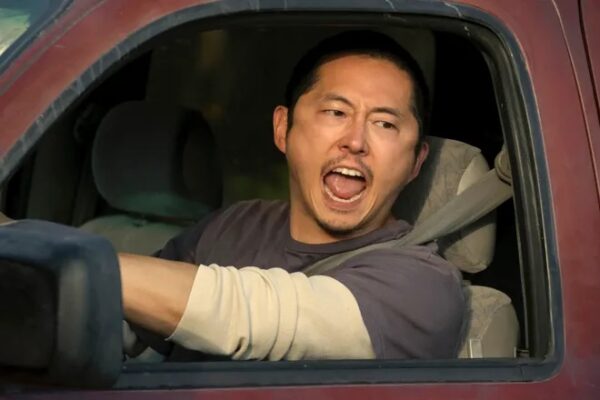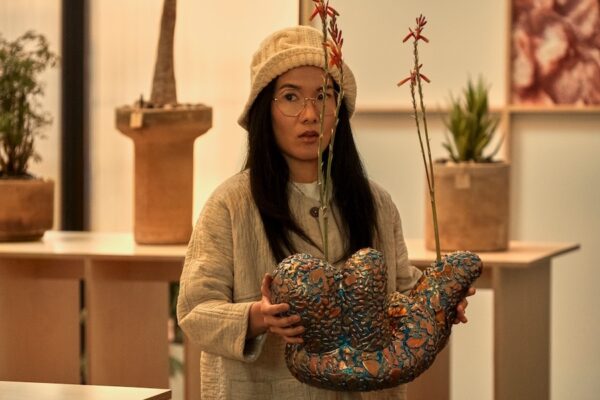Television Review: Netflix’s “Beef” – Don’t Tread on Me
By Jeremy Ray Jewell
Beef‘s reflection on today’s growing outrage and extremism reveals a lot about class and inequality.

Steven Yeun in a scene from Beef. Photo: Netflix
Netflix’s Beef is being widely praised, and that praise is deserved. It is probably the most important, wide-reaching cultural event at this moment, but for reasons most reviewers have failed to pin down. Commentaries on its reflections on race and gender are all-too predictable, though certainly warranted. This series, by and about Asian Americans, was also developed in a very personal way: the show’s Asian American writers drew directly from their personal experiences. But I would argue that the series’ concerns are broader than those of family migration, as many critics would have it. Beef probes inequality, extremism, and solidarity, issues that are not only relevant to Asian Americans, but to all Americans… as well as South Koreans, Japanese, and Taiwanese. The real star of the narrative is the violent malaise — erupting all throughout the developed world — generated by rising inequality and its impact on the shrinking material expectations of younger generations. To miss this point would be as if to see Bong Joon-ho’s film Parasite as about nothing more than real estate.
Beef is a comedy-drama series limited to 10 episodes. It was created by Lee Sung Jin and stars Steven Yeun as Danny Cho and comedian Ali Wong, in her first leading dramatic role, as Amy Lau. Other supporting cast members include Joseph Lee, Young Mazino, David Choe, and Patti Yasutake.
A road rage incident in a hardware store parking lot turns Danny and Amy into enemies. Their angry reactions quickly devolve into a long, protracted, and potentially fatal feud. The story probes what brought the irascible duo to the parking lot. Danny is a contractor who was returning merchandise to a chain hardware store. Amy is trying to sell her small luxury plant business to the store’s corporate owner. Among his numerous pressures — financial woes have exacerbated failed suicide attempts — Danny is supporting his younger brother as well as helping to bring his Korean parents to the US. Amy is struggling to appease the expectations of her husband’s mother. Mom is pushing her son to make good in his father’s line of work, despite his having no exceptional talent or passion for it. Through subsequent escalations and side plots, both adversaries become more sympathetic to us — though not to one another. One exigent fact underlines the drama: despite their similarities, Amy and Danny are at odds because of their very different relationship with the hardware store. Danny is a blue collar worker who, ironically, attempted to kill himself with the tools of his trade, purchased through the corporate brand that views him (as we learn) with disdain. Amy, by contrast, is schmoozing with the head of that brand in an attempt to escape her humble beginnings. Both characters are profoundly alone — yet they have every reason to find solidarity.

Ali Wong in Netflix’s Beef.
The fact that ethnicity dances in and out of focus throughout the series suggests that identity alone will not encourage solidarity. Even as it examines the rise in outrage and extremism, the series looks at the diversity within Asian American perspectives, a variety that no doubt reflects the various points of view in the writers room. Yeun’s and Wong’s characters can’t come together because of their relationships to class and social status. Amy needs to placate the economic elite and that undercuts her ability to sympathize. In fact, it initially feeds her anger. Meanwhile, Danny looks for ways to rationalize his rage, humorously fantasizing that his “real” foe is Amy’s Japanese-American husband. His cousin Isaac (David Choe) also comes up with bogus excuses for his unfavorable conditions, including amusing references to Filipino prison gangs and Italian “peninsula mentality.”
Amy, ultimately, has what Danny does not: choice. She belongs to what academic Elizabeth Currid-Halkett refers to as the “aspirational class.” Amy shares a similar humble beginning with her enemy, but she also has the option to deviate from the norms set by the upper class. She can empathize with Danny, who is receptive, and she can choose solidarity. Moreover, this unity is not a shallow, ethnocentric simulacrum, the kind of feel-good comradeship the show satirizes several times (via appeals to “Asian sisterhood”). In this way, the ethnic specificity of Beef, with its undeniable authenticity, does not undercut its universal message about the power of class.
Neither Asianness nor whiteness is two-dimensional in this series. For example, Danny himself stereotypes his roots, at one point griping that “Western therapy doesn’t work on Eastern minds” (an interesting expression of “empowerment”). Ironically, Danny encourages his brother to forget his love interest when she slights him because she is white (she is not).
Still, despite depicting the fluctuating nature of identity politics, Beef, to its credit, comes back to economic reality. It is the haves versus the have-nots and the question of where the go-getters will choose to stand. In that way, the show’s examination of today’s outrage and extremism is directly linked to our increased radicalism and divisiveness. The series presents a detailed map of societal tension and conflict: characters from different social classes and ethnicities have to navigate their way through a world that is filled with rising inequality, political polarization, and cultural war.
Beef suggests that desperation is driving clashing groups in the developed world to embrace isolation and extremism. It has become taboo to suggest there is anything in common between apparent enemies. Not only is this true in US politics, it is true in South Korea, which has one of the fastest growing rates of income inequality among OECD nations. It is also true in Asia, regionally speaking: the Taiwanese remember Seoul’s recognition of Beijing, the Chinese remember the Nanjing Massacre, and so on. Such generalized animosity leads to predictable results. The power to choose empathy, even for purely practical purposes, is a hard sell these days.
A more nuanced view suggests that we have a choice in how we respond to the current state of affairs, even in the face of societal pressures that might encourage self-centeredness and individualism. Beef is set primarily in California, a state where Asian American stories are prevalent. It is also a state synonymous with the tech industry, on which the global financial order increasingly depends. And it is, of course, the setting of John Steinbeck’s classic novel The Grapes of Wrath, which took its title from the Civil War anthem “Battle Hymn of the Republic.” The song’s line, “He is trampling out the vintage where the grapes of wrath are stored,” refers to the idea of divine retribution, the punishment of those who have sown the seeds of injustice and inequality. Steinbeck imagined that divine retribution would come for the migrant farm workers of the Dust Bowl. Beef suggests that it might come for us, if we can only stop trampling one another.
Jeremy Ray Jewell writes on class and cultural transmission. He has an MA in history of ideas from Birkbeck College, University of London, and a BA in philosophy from the University of Massachusetts Boston. His website is www.jeremyrayjewell.com.
